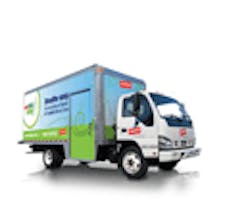FRAMINGHAM, MA. For fleet managers, AltWheel’s 4th Annual Fleet Day was the place to be on Monday. The event at Staples World Headquarters featured more than 27 alternative fuel and hybrid vehicles as well as dozens of sessions in which fleet managers and industry experts could discuss the latest in green technologies.
Along with hybrid vehicles on display, the event showcased a selection of products designed to cut idling time, reduce carbon emissions and slash fuel costs. Staples, one of the show’s main sponsors, showed off one of two Isuzu Class 6 hybrid vehicles it’s testing in the U.S.
Staples fleet manager Michael Payette said he’s been very pleased so far with the performance of the vehicles, which include one running daily routes in Boston and the other in Los Angeles.
“When I trained the two guys who operate this truck, I said ten years from now, every truck on the road will probably be a hybrid,” Payette said. “At least 50% of my fleet could benefit today from hybrid technology. I’ve got some trucks that do a lot of miles, and they would be carrying along some expensive hardware, so it’s not for every route that’s out there, but is for most of them.”
The truck is rated 19,500-lb. GVW and boast both a 4 HK diesel engine and an electric motor. The hybrid system is from Torrance, CA-based Enova Systems and Staples worked with its bodybuilder, Morgan Corp., to outfit the truck to its specifications. The hybrid system includes its own radiator, water pump and fan that maintains a constant temperature in the unit. In addition, Payette said, the hybrid system can actually keep the vehicle’s heater core warm for several minutes at a time, allowing the truck to be shut off for two to three minutes at a time in the winter without suffering heat loss in the cab.
“Everything to do with this truck and its hybrid drive system gets relayed via international cell phone to the [Isuzu hybrid center in Tokyo],” Payette said. “They know when it’s moving, they know everything this truck is doing.”
Payette said training the drivers to drive a hybrid was easy. “The reality is if they drove a conventional-powered truck the way you’re supposed to drive a hybrid, you’d get 15% better fuel economy to start with because you’re supposed to drive a hybrid by gently accelerating so the electric [motor] does more than push it,” he said.
The test trucks will run for one year. Payette said everyone is waiting to see the performance in cold-weather Boston during the winter. Staples is also testing a 24-ft. hybrid International with an Eaton power system in Atlanta and will test a leased vehicle from Penske as well.
Mack Trucks and Braun’s Express, based in Hopedale, MA, displayed a battery-powered APU unit. The unit, which Jerry Warmkessel, Mack marketing product manager-- highway products, described as a key-off HVAC system, uses four AGM (absorbed glass mat) batteries. The batteries use the truck’s alternator as a charging source.
“Thousands of trucks put APUs on, but unfortunately, in a lot of places, they can’t use them anymore and they’re realizing it’s not the way to go,” Warmkessel said. “The other thing with [traditional] APUs is its a small diesel engine with a starter, alternator; it’s got to have the oil changed, it’s got belts and costs about a $1,000 a year to maintain on average—but with a system like this that’s battery operated, once you install it, it’s totally maintenance-free.”
The APU, made by Idle Free Systems of Watetown, WI, uses about 12 oz. of diesel fuel for each 16 hours the heating system runs. The air conditioning unit requires no fuel, said Stephen Normandin, IT manager for Braun’s.
Braun’s has nine trucks in its truckload fleet of 32 tractors using the system. Idling time was cut in half for the vehicles in a test period between April 1 through Sept. 1, logging an average of 863 hours of idling time for a truck without the APU and just 458 hours for the nine Mack tractors with the unit.
“So, far, we’ve saved $17,000 in fuel costs since we’ve been running this and that factors out to about $40,000 a year for these nine trucks,” said Normandin. The unit can also power accessories, including a laptop, if need be.
Warmkessel said the expected life cycle for the APUs is eight to ten years, meaning Braun’s can expect each unit, which costs about $9,000 to install, to cover two tractors. Chuck Patton, fleet manager, said the plan is to equip one truck a month with the unit.
“To maintain the drivers, you have to do certain things, and on the nine trucks, I get no complaints from the drivers,” Patton said. The units are so quiet, he said, “some [drivers] sleep during the day and they’ll complain about the truck next to them.”
View more Equipment and other commercial trucking-related articles from Fleet Owner.
